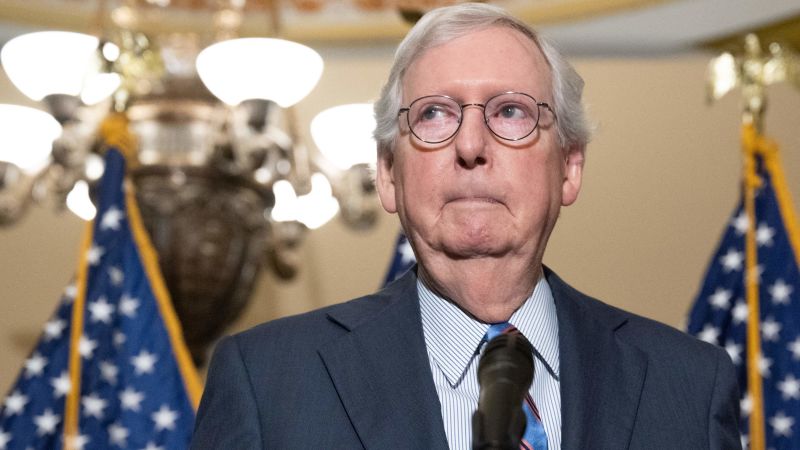
CNN
—
In August, Mitch McConnell told a hard truth.
“I think there’s probably a greater likelihood the House flips than the Senate,” the Senate minority leader said at the time. “Senate races are just different. They’re statewide. Candidate quality has a lot to do with the outcome.”
His comments caused consternation within the Donald Trump wing of the GOP, as many of the party’s nominees were endorsed by the former president. But coming out of Tuesday’s election, there’s no doubt that McConnell was right – that the weakness of several of Republican Senate nominees jeopardized the party’s chances of winning the majority.
It’s worth noting before I go any further that there is still very much a path for Republicans to win the Senate majority. They need to win two of three races: Arizona, Georgia and Nevada. As of Thursday, the Republican nominee is leading in Nevada and trailing in Arizona. And the Georgia contest is headed for a December 6 runoff.
But, there’s also absolutely no question that candidate quality had a profound impact on the narrowness of that path for Republicans. Consider:
* Arizona: Blake Masters who had a long record of controversial statements, wound up winning the Republican nomination thanks to the endorsement of Trump. Masters was an unsteady general election candidate who struggled to convince national Republicans that his campaign was worth the financial investment. The McConnell-aligned super PAC Senate Leadership Fund pulled out of the race in the final stretch. Former Trump aide Stephen Miller took issue with that decision in a tweet on Thursday. “If Mitch had spent in Arizona – instead of blackballing Blake and funneling money in Alaska to defeat the de fact[o] GOP nominee – Blake would have already won handily,” wrote Miller. “This was a deliberate choice.”
* Georgia: Republican Herschel Walker is headed to a runoff with Democratic Sen. Raphael Warnock after neither candidate received 50% of the vote. Last year, CNN reported that McConnell privately expressed concerns about Walker’s candidacy and suggested that former Sens. David Perdue or Kelly Loeffler should consider running. But with the full weight of Trump’s support behind him, Walker cruised to the GOP nomination. In the general election, the former football star faced allegations he pressured women he was involved with to have abortions. Meanwhile, Republican Gov. Brian Kemp won reelection outright on Election Day.
* New Hampshire: Establishment Republicans backed Chuck Morse in his primary campaign against on again, off again election denier Don Bolduc. Bolduc didn’t win Trump’s endorsement until the general election campaign, though he won the primary with the support of the former president’s base. But he never showed he could appeal to voters outside that base, and lost to Democratic Sen. Maggie Hassan, who was seen as vulnerable at the start of the cycle. And GOP Gov. Chris Sununu – who, like Kemp, has drawn Trump’s ire – went on to easily win another term.
* North Carolina: Trump shocked the political world in 2021 when he threw his endorsement behind little-known Rep. Ted Budd in the crowded Republican primary race to replace retiring Sen. Richard Burr. Budd won the race over former state Supreme Court Justice Cheri Beasley, but outside groups spent heavily to get him across the finish line.
* Ohio: Much like in North Carolina, this was a state that Republicans were hoping they wouldn’t have to dedicate significant financial resources. But Trump-endorsed J.D. Vance showed little aptitude for the campaign trail following his primary victory. The super PAC aligned with McConnell wound up spending tens of millions of dollars just to keep this race in GOP hands. Vance defeated Democrat Tim Ryan, who ran a stronger-than-expected campaign in the red-leaning state. But if Vance had been a stronger candidate and raised more money for his campaign, those outside group funds could have been spent elsewhere to expand the Senate playing field.
* Pennsylvania: Trump-backed Mehmet Oz narrowly won the Republican nomination in a contested primary. But Oz struggled to coalesce the GOP base behind him after the divisive primary and never seemed to gain his footing over attacks that he was a carpetbagger from New Jersey. Oz ultimately lost to Democrat John Fetterman.
Taken together, there’s little doubt that McConnell’s “candidate quality” criticism was, in hindsight, correct. In race after race, Republicans underperformed expectations – forcing the national party and its affiliated outside groups to ride to the rescue. The party won some of those races, but it came at the cost of investing more heavily in other states.
In short: Mitch McConnell was right.
Note:- (Not all news on the site expresses the point of view of the site, but we transmit this news automatically and translate it through programmatic technology on the site and not from a human editor. The content is auto-generated from a syndicated feed.))




I like the helpful information you provide in your articles.
I’ll bookmark your weblog and check again here regularly.
I am quite sure I’ll learn a lot of new stuff
right here! Good luck for the next!